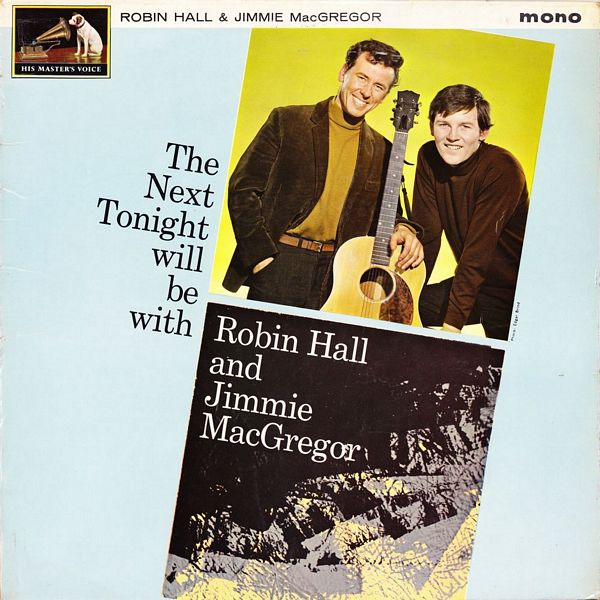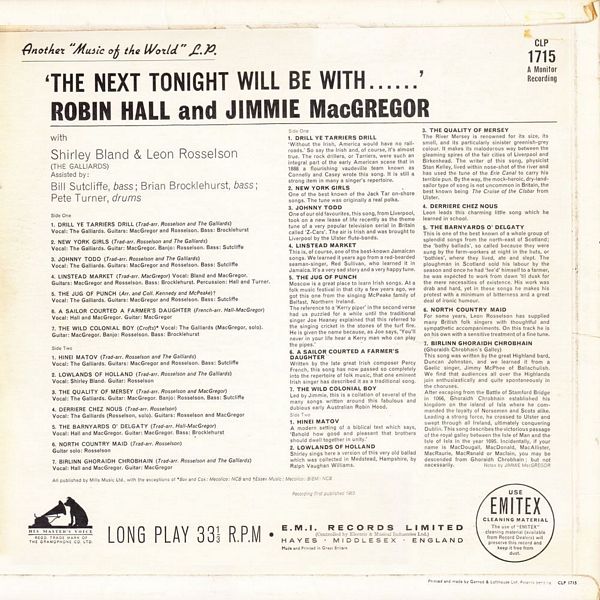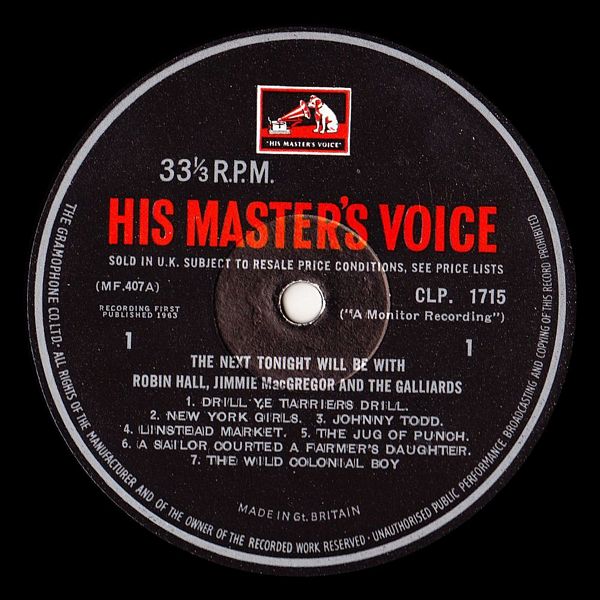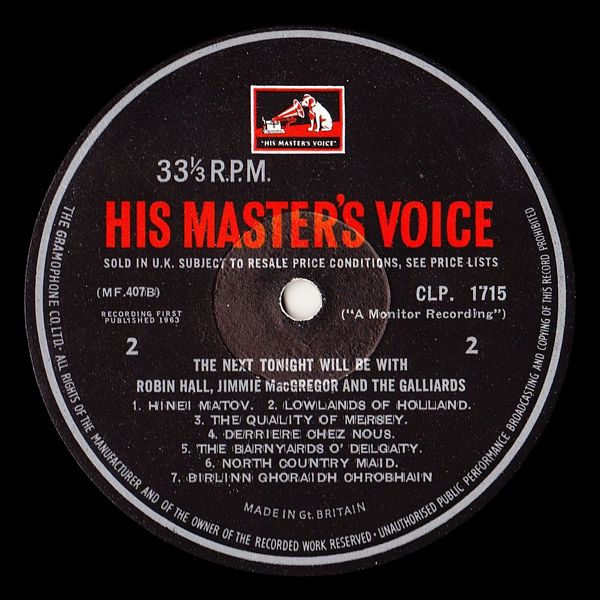

 |



|
Sleeve Notes
DRILL YE TARRIERS DRILL
"Without the Irish, America would have no railroads." So say the Irish and, of course, it's almost true. The rock drillers, or Tarriers, were such an integral part of the early American scene that in 1888 a flourishing vaudeville team known as Connelly and Casey wrote this song. It is still a strong item in many a singer's repertoire.
Vocal: The Galliards. Guitars: MacGregor and Rosselson. Bass: Brocklehurst
NEW YORK GIRLS
One of the best known of the Jack Tar on-shore songs. The tune was originally a real polka.
JOHNNY TODD
One of our old favourites, this song, from Liverpool, took on a new lease of life recently as the theme tune of a very popular television serial in Britain called "Z-Cars". The air is Irish and was brought to Liverpool by the Ulster flute-bands.
Vocal: The Galliards — Guitars: MacGregor and Rosselson; Bass: Sutcliffe
LINSTEAD MARKET
This, of course, one of the best-known Jamaican songs. We learned it years ago from a red-bearded seaman-singer, Red Sullivan, who learned it in Jamaica. It's a very sad story and a very happy tune.
Vocal: Bland and MacGregor — Guitars: MacGregor and Rosselson; Bass: Brocklehurst; Percussion: Hall and Turner
THE JUG OF PUNCH
Moscow is a great place to learn Irish songs. At a folk music festival in that city a few years ago, we got this one from the singing McPeake family of Belfast, Northern Ireland.
The reference to a "Kerry piper" in the second verse had MS puzzled for a while until the traditional singer Joe Heaney expIained that this referred to cricket in the stones of the turf fire. He is given the name because, as Joe says, "You'll never in your life hear a Kerry man who can play the pipes."
Vocal: The Galliards — Guitars: MacGregor and Rosselson; Bass: Sutcliffe
A SAILOR COURTED A FARMER'S DAUGHTER
Written by the late great Irish composer Percy French, this song has now passed so completely into the repertoire of folk music, that one eminent
has singer has described it as a traditional song.
Vocal: Hall and MacGregor — Guitar: MacGregor
THE WILD COLONIAL BOY
Led by Jimmie, this a collation of several of the many songs written around this fabulous and dubious earty Australian Robin Hood.
Vocal: The Galliards (MacGregor, solo) — Guitar: MacGregor; Banjo: Rosselson; Bass: Brocklehurst
HINEI MATOV
A modern setting of a biblical text which says, "Behold how good and pleasant that brothers should dwell together in unity."
Vocal: The Galliards — Guitars: MacGregor and Rosselson; Bass: Sutcliffe
LOWLANDS OF HOLLAND
Shirley sings here a version of this very old ballad which was collected in Medstead, Hampshire, by Ralph Vaughan Williams.
Vocal: Shirley Bland — Guitar: Rosselson
THE QUALITY OF MERSEY
The River Mersey is renowned for its size, its smell, and its particularly sinister greenish-grey colour. It makes its malodorous way between the gleaming spires of the fair cities of Liverpool and Birkenhead. The writer of this song, physicist Stan Kelley, lived within nose-shot of the river and has used the tune of the Erie Canal to carry his terrible pun. By the way, the mock-heroic, dry-land-sailor type of song is not uncommon in Britain, the best known being The Cruise of the Clabar from Ulster.
Vocal: The Galliards — Guitar: MacGregor; Banjo: Rosselson; Bass: Sutcliffe
DERRIERE CHEZ NOUS
Leon leads this charming little song which he learned in school.
Vocal: The Galliards (Rosselson, solo) — Guitars: Rosselson and MacGregor
THE BARNYARDS O' DELGATY
This one of the best known of a whole group of splendid songs from the north-east of Scotland; the "bothy ballads", so called because they were sung by the farm-workers at night in the huts, or "bothies", where they lived, ate and slept. The ploughman in Scotland sold his labour by the season and once he had "fee'd" himself to afarmer, he was expected to work from dawn 'til dusk for the mere necessities of existence. His work was drab and hard, yet in these songs he makes his protest with a minimum of bitterness and a great deal of ironic humour.
Vocal: Hall and MacGregor — Guitar: MacGregor; Bass: Brocklehurst
NORTH COUNTRY MAID
For some years, Leon Rosselson has supplied many British folk singers with thoughtful and sympathetic accompaniments. On this track he is on his own with a sensitive treatment of a fine tune.
Guitar solo: Rosselson
BIRLINN GHORAIDH CHROBHAIN
(Ghoraidh Chrobhain's Galley) This song was written by the great Highland bard, Duncan Johnston, and we learned it from a Gaelic singer, Jimmy McPhee of Ballachulish. We find that audiences all over the Highlands join enthusiastically and quite spontaneously in the choruses.
After escaping from the Battle of Stamford Bridge in 1066, Ghoraidh Chrobhain established his kingdom on the island of Isla where he commanded the loyalty of Norsemen and Scots alike. Leading a strong force, he crossed to Ulster and swept through all Ireland, ultimately conquering Dublin. This song describes the victorious passage of the royal galley between the Isle of Man and the Isle of Isla in the year 1095. Incidentally, if your name is MacDougall, MacDonald, MacAllister, MacRaurie, MacRanald or MacIain, you may be descended from Ghoraidh Chrobhain; but not necessarily.
Vocal: Hall and MacGregor — Guitar: MacGregor
Notes by JIMMIE MacGREGOR